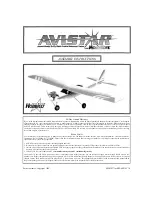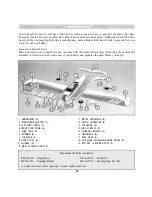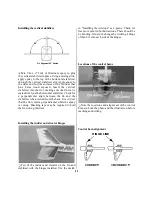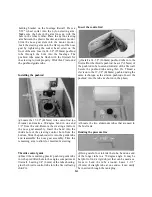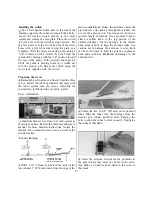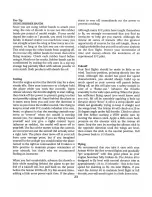
holding bracket on the fuselage firewall. Press a
5/32" wheel collar into the nylon steering arm.
Make sure the hole in the arm lines up with the
hole in the wheel collar. Place the nylon steering
arm between the plastic bracket and motor mount.
Slide the nose gear stem into the motor mount.
Lock the steering arm onto the flat spot of the nose
gear by tightening the socket head screw on the
front of the arm. Insert a 14-1/8" (359mm) pushrod
tube through the hole into the fuselage. The
pushrod tube must be flush with the firewall for
the steering to work properly. Wick thin CA around
the pushrod guide tube.
Installing the pushrod
Q Locate the 17-1/2" (445mm) wire control rod (no
threads) and make a 90-degree bend in one end
1/2" from the end. Remove the steering arm from
the nose gear assembly. Insert the bend into the
inside hole of the steering control horn from the
bottom. Slide the pushrod wire into the guide tube
and reassemble the nose gear assembly. Trim the
remaining arm to allow for maximum steering.
Throttle control guide
Q Insert the remaining plastic pushrod guide tube
into the predrilled hole in the engine compartment
firewall. Leaving 1/4" (6mm) of the tube showing,
glue the throttle control tube into the firewall using
thin CA.
Insert the control rod
Q Install a 14-1/8" (360mm) pushrod tube into the
firewall for the throttle pushrod. Leave 1" (25mm) of
the pushrod tube to extend forward of the firewall.
Secure the pushrod tube using thin CA. Thread a
clevis onto the 17-1/2" (440mm) pushrod using the
same technique as the aileron pushrods. Insert the
pushrod into the tube as shown in the photo.
l-l Locate the two aluminum tubes that are used in
the fuel tank.
Bending the pressure line
Q Being careful not to kink the tube, bend one end
of the longer tube to a 70 degree angle. It may be
helpful to find a rigid object that can be used as a
form to bend the tube around. Leave 1-1/2"
(38mm) of straight tube at one end so it can easily
be inserted through the tank plug.
14

